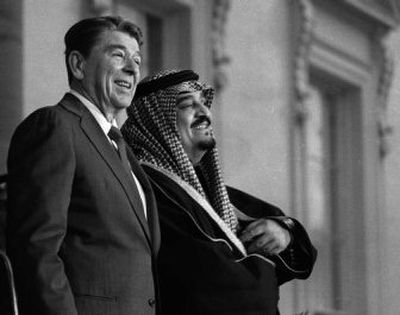Saudi leader dies, half brother takes throne

RIYADH, Saudi Arabia – King Abdullah quickly assumed the Saudi throne Monday after the death of his long-ailing half brother, giving a smooth transition to the leadership of this key U.S. ally and oil giant already grappling with extremists and debating the need for reform.
After a decade as de facto ruler and the prime mover of recent reforms, the popular 81-year-old Abdullah is expected to seek to consolidate his power by bringing more allies into government and perhaps open the door for younger, more modern princes to play a role.
Some people expect him to face behind-the-scenes competition from a clique of half brothers who hold their own powerful posts and have close ties with Saudi Arabia’s conservative Muslim clerics, although the royal family’s swift backing for the new king hinted at some consensus.
Fahd, the country’s absolute monarch since 1982 until he was debilitated by a 1995 stroke, died early Monday at age 84 after nearly two months in a Riyadh hospital.
The mechanism of succession moved quickly along tracks laid down long ago: Abdullah stepped in as king, while Fahd’s brother Prince Sultan, the 77-year-old defense minister, became crown prince and next in line to the throne.
Abdullah has been the main force behind unprecedented reforms and a heavy crackdown on al-Qaida-linked militants following a series of terror attacks in May 2003.
Now armed with the power of the throne after years in the more tenuous position of de facto ruler, Abdullah will likely move to advance supporters into key positions and push forward on the reform and anti-terror tracks.
But he must tread carefully: Prince Sultan and others in the close-knit circle of Fahd’s full brothers known as the “Sudairi Seven” hold key security posts and are seen as resistant to swift change.
Few expect the current generation of rulers – the sons of Abdul-Aziz bin Saud, the Bedouin chief who welded the kingdom together under his name in 1932 – to hold the throne as long as Fahd’s 22-year reign. That opens the door to the next generation of numerous grandsons, but beyond Sultan there is no clear line of succession.
As the family installed Abdullah, Saudis prepared to bury their longest-ruling monarch today with a mix of the austerity dictated by their puritanical Wahhabi version of Islam and the grandiosity befitting a kingdom whose oil riches fueled investment across the Muslim world.
By Monday afternoon, hotels in Riyadh were packed as Saudis flocked to the capital to express their condolences to the royal family and congratulate the new king. Numerous Arab leaders – including Egypt’s Hosni Mubarak and Jordan’s King Abdullah – also were coming.
Foreign leaders planned to attend prayers for the dead at a mosque this afternoon. But Fahd was to be buried in an unmarked grave at a cemetery alongside previous kings and commoners – the tradition in Wahhabism, which frowns on the visiting of graves of family or revered figures.
State-run television ran Quranic verses in mourning, and Information Minister Iyad bin Amin Madani’s voice wavered with emotion as he announced Fahd’s death Monday morning: “With all sorrow and sadness, the royal court … announces the death of the custodian of the two holy mosques, King Fahd bin Abdul-Aziz.”
The White House was informed of Fahd’s death about 2:30 a.m. President Bush called Abdullah to express condolences and also offered congratulations to the new king, spokesman Scott McClellan said.
The capital’s streets remained busy, and many Saudis said they had prepared themselves for Fahd’s death during his long illness.
“We will all pray for Fahd, who was a father figure to us all,” said Ibrahim al-Qahtani, who was shopping at a Riyadh mall with his children.
Before becoming de factor ruler, Abdullah had been less inclined than Fahd to see the kingdom entwined in the decades-old alliance with the United States, but he has preserved close ties with Washington. After the Sept. 11 attacks, which were carried out by 15 Saudis and four other Arabs, Abdullah decided he had to initiate changes in his deeply conservative country.
Abdullah emphasized stability Monday, issuing a decree that all government ministers would retain their positions for now.